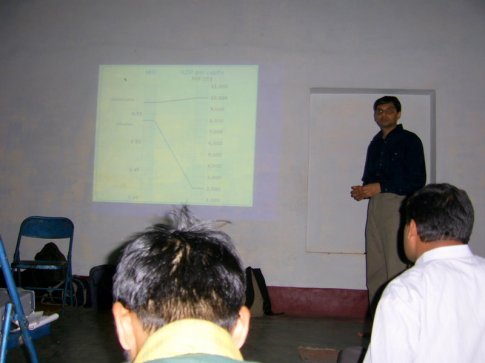Onto more people.
The scary-looking person in the photo is Dr. Deepak Malghan, who is currently writing an intellectual biography of J. C. Kumarappa, and was another speaker in the workshop. He isn’t as scary in real life, though his English is. Deepak’s specialty is giving a clear picture of things from a theoretical context, and he does it very well.
The talk was called ‘Science, State, Market, Society and Ecology’ or something like that. His focus was on two main things: what science and technology in India is doing, and problems of linked to a poor definition of progress and development. The first part was more interesting, will elaborate.
Modern India can be said to stand on three pillars: State, Market and Society. The problem with science and technology in India seems to be that their main focus is either the State or the Market. The State angle is pretty clear: our former President has published only two scientific papers in his entire career, and the people praise him as a scientist. This is due to his being the head of DRDO, trying to make India self sufficient in methods to kill people (a deterrent, of course). One way progress is measured is by the amount of advanced weaponry a country has, which is directly a State interest.
The market angle is even more apparent: our best minds working to solve problems which will make sharper videos, clearer sound, ubiquitous connectivity, long lasting mobile phones etc., etc., Most of these are things are bought and sold in Western countries, and many proudly admit that their product ‘will touch the Indian market in only another 3-4 years’. A market trend may be indicative of people’s choice, but the crucial point is that it is the people’s choice weighed by the amount of money they have. Thus, more people work on making mobile phones into computers than making computers into catalysts for development. You will find almost 24-hour electricity in Bangalore where the big people have generators anyways than in a village during crucial examination times simply because Bangalore pays more rupees per kilowatt.
This is the centenary year of IISc and apparently there was a committee that was setup to research the Institute’s history and find the technologies that it had delivered to the Indian people. The result: zero (or very close to it). Being a publicly funded institution, this is not only shameful, but immoral. Deepak went to state that US universities are accountable to the societies that they are in, and actually solve problems faced in the society, unlike our boys in the IISc or IITs (less the mention of IIMs, the better). No audited reports of IISc are ever published, (unlike say, UC Berkeley) and insiders know what a farce auditing is. Now, if the premier institutions funded by taxpayer’s money cannot help solve problems that we face, then who are they accountable to ?
An extempore in the evening was by Prakash, an activist from Dakshina Kannada who happened to drop by. He looked at the issue from the lowest empirical view, saying that he was unable to see how the present trends of development can be stopped or even wether they should be stopped. His view that media is generating desires in a phenomenally large amount of people which aggregatively generate a tremendous force pushing development. Castes, Classes and Genders who were suppressed have suddenly found liberalization to work in their advantage. His question was: Once you give freedom to a people, how can you tell them not to do things ? How can you tell a girl kept down by athoritative parents not to elope ? How can you tell a Dalit boy not to wear fake Adidas and Ray-Bans ? How can you tell farmers not to buy fridges, bikes and other things they see on TV ? To Prakash, all critiques of development which do not take into consideration such issues are of little relevance.
I countered this thesis by raising the question of duties. All the points that he had raised were about rights, duties never figured even once anywhere. Forget about duties, what about consequences ? DDT may kill malaria bearing mosquitoes, but does a farmer know what it does to his environment and eventually to himself ? Would a person who has such knowledge use DDT ? As I have always maintained, India started on the development path without ever providing its citizens with the cultural skills to benefit most. As a result, most have suffered at the hands of a few. However one may criticize the development paradigm that the West put forth, it is a fact that the average life expectancy, income, social security there is far superior to anything here. The West had an advantage of a smaller population. If to reach similar Quality of Life as in the West we have to consume as much as they do, we will need a few more earths. Prakash’s views showed how dangerous it can be if one does not stop and look at the bigger picture once in a while.
This is the place where we stayed, and we got to see quite a few beautiful birds, including the rare to sight and beautiful Scarlet Minivet , Paradise Flycatcher, Tickell’s Blue Flycatcher among others. Nice place to sit and reflect, and has been quite and experience.



Upload the presentation of Dr. Malghan please! Strong writing once again.
don’t have it with me right now, will do so later and notify!
Ya I agree with Deepak..(Don’t say has to agree)I agree with Prakash..I agree with Joy also…So whom do I disgree with? There is a point in what every one of you said..But there is some point that is missing to make all these a collective truth..This might sound similar to my last question for your previous article..But then how do you define on the Duties..So to define duties just like each one of us have set goals(especially the normal one’s and all those following mantra of IT..) Should we have some goal as a human race(to use everything or to create more wastes or to create fully sci fi world…)How will we decide upon such goal..which might help us to say to the people these are what our duties…But then some have always questioned the goals(or slogans) such as “SAVE THE WORLD”…But then u said something like.. to stop and look at the big picture..Who has the time BOSS..They have not come here for morning walk it is a RAT Race(dialogue copied)..They always want to be with the majority..Because they want to be on SAFER side under any condition..Coz as a human(as an animal?!!!) we are mostly selfish( I do think such an answer is that of an escapist)..Words might look more pessimistic but then they were just questions that might help to those who are thinking to find some good anwers, to look at some of the human aspects before framing any rules..
And, what does Mr. Prakash work on at Dakshina KannaDa ? I’m curious to know.
Mystical web: Prakash is a farmer/author. worked for sometime in the place where we were staying.
Anonymous: agreed, people are always on the safer side. then, it becomes the imperative of policy makers to see that the ‘safer’ side is suitably changed to meet certain goals. Not everyone looks at the bigger picture, but ultimately that is the only way out. until then, we will need peripheral institutions like the State and religion.
Everyone is concerned with ‘what is’. Some dream about ‘what should be’. finally, a pragmatic ‘what can be’ is to be chosen. No one denies that this process is slow, but it is better than nothing.
I do not believe in ‘world goals’ and such. sensitizing people will help people set ‘personal goals’ which is sufficient for me.
Hi! I m Pratheep..I read ur postings..Interesting..
Can I have ur Pvt Mail Id pls?
Pratheep: thanks!
you can reach me at joy (dot) merwin (at) gmail (dot) com
you working with Dr. Shambu ?
Well written article. It will be great if you can also write in SiliconIndia as I am a member of SiliconIndia, I am sure that most of the members will love reading it. http://www.siliconindia.com/register.php?id=T49I1Fh5
sanjana: sorry, not a professional :( you could provide a link, if you can ;)
This is again the same anonymous continuing:Some where in your previous articles you did mention that Political will is the need of the hour and also in an other article mentioned that ‘social organisation would tend to more and more rational organisation in terms of efficiency, run by a scientifically guided bureaucracy.Thankfully, we do not yet live in an age where managers rule every aspect of our lives, from what we eat to who we sleep with. Though it is obvious that an efficient bureaucracy will lead to maximally efficient organisation of human productive output, it is far from obvious that that is what people want, and far less obvious whether it can really be implemented.’
So the ‘goal’ part is just realistic part of such efficient organisation without intruding too much into one’s independence…Why do I think so?
Now coming back to your Sensitizing people to set ‘Personal Goals’: I feel that if we look at the history this is what people have tried to do and have failed.(For example as mentioned somewhere Gandhi was a biggest failure in teaching Indians hygienic sanitation. This was just an example which might look absurd as we have more literacy now and while he was trying,the case was totally different). But with the amount of literacy that we have now I really don’t think having some ‘goal’ as a part of life will fail..U might question then why not ‘Personal goal’ can succeed..Again because people think less of right or wrong and more about “MASS HYSTERIA”..Am i speaking about creating an HYSTERIA of ‘goal’? Can any HYSTERIA remain permanently?
Also don’t ask me ‘is it not the stubborn acts of achieving goals that have resulted in massaccres’..That is why I mentioned about Literacy..We shud accept that literacy has done some good(except for the fact that more and more people of my generation are confused,caught in the mystical web of their own or wandering around in their never ending thoughts…)
Anon: achieving ‘efficient organisation’ is the prerogative of the state, not the society. The goal part is an attempt to instill values in people which make them more sensitive to the society and environment around them and enable people to make independent choices. I had also mentioned somewhere that rationality has its limitations, and quite often ends up imposing someone’s views on someone else. This is what is happening nowadays, esepcially with big dam displacements and mining in traditional tribal areas.
Efficiency is an interesting term, read next post.
Just because people have tried and failed does not mean one should stop again. Bangalore has the highest amount of literate people/sq km and look at the place. Melkote has a much lesser number, and they have more rainwater harvesting tanks(lakes) than Bangalore (which were all drained and used for constructing apartments). Literacy and education have no correlation. Most literate ppl are uneducated, some illiterate educated.
Hysteria needed when you think personal goals are global ones. For each person to set her own ideals, why does one need this ? Literacy has done something good, agreed. economic status and literacy are highly correlated nowadays.
Hello would you mind sharing which blog platform you’re working with?
I’m planning to start my own blog in the near
future but I’m having a difficult time choosing between BlogEngine/Wordpress/B2evolution and Drupal.
The reason I ask is because your layout seems different then most blogs and I’m looking for something completely
unique. P.S Apologies for getting off-topic but I had to
ask!